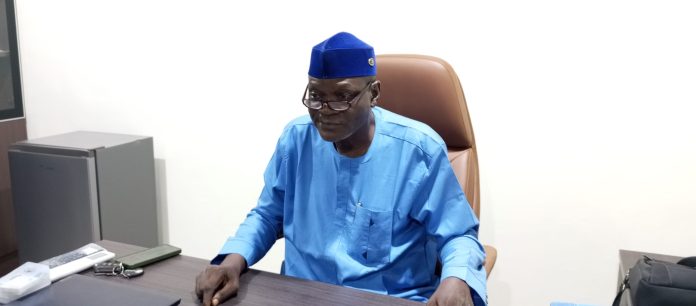Professor AKINTOYE Ishola Rufus, Head of Babcock University Business School, shares with Anthony Nwosu the importance of industry-aligned cybersecurity training and Babcock’s commitment to cultivating skilled experts through its partnership with ThinkCyber Nigeria. This collaboration, he explains, aims to strengthen the cybersecurity talent pipeline, bringing experiential learning tools like ThinkCyber’s CYBERIUM ARENA to the forefront. By offering students and corporate professionals hands-on experience in a realistic cyber simulation environment, Babcock University equips them to address current cyber threats effectively. Professor Rufus also explores the heightened vulnerabilities within Nigeria’s financial sector, emphasizing the need for continuous learning and proactive strategies to safeguard assets and data.
Can you tell us more about the partnership between Babcock Business School and ThinkCyber Nigeria?
Certainly. I lead Babcock Business School, which opened in September 2022 in Ilishan, Ogun State, as an extension of Babcock University. Our goal from the outset was to create a space for immersive learning, and to that end, we have collaborated with prominent organizations like ICAN, CIBN, and ThinkCyber Nigeria. ThinkCyber’s role in training our students in cybersecurity has been transformative; the results are evident in the positive feedback we’re receiving from the industries where our students now work. We employ a 30/70 training model here—meaning 70% of our teaching is practical and hands-on, while 30% focuses on theory. This model applies across disciplines, from accounting to tech-related courses, as we believe deeply in the power of experiential learning to prepare students for today’s complex job market.
ThinkCyber’s involvement has had a lasting impact. Our graduates have secured roles with multinationals like PwC, and they’re thriving. In addition to their in-class training, students have the unique opportunity to complete a one-year training stint in Poland. This blend of international and local exposure sets them apart, enabling them to engage with global challenges while remaining deeply rooted in Nigerian realities.
Cyber threats today are more sophisticated than ever, and our partnership with ThinkCyber ensures that we are equipping students to navigate these complexities head-on. Not only are we training traditional students, but we also offer executive education programs that attract CEOs, managing directors, and senior business leaders. Our goal is clear: to foster world-class cybersecurity experts who can make an impact wherever they go.
What are your thoughts on the talent gap in cybersecurity in Nigeria and Africa?
The talent gap in cybersecurity is a global challenge, but it’s especially critical here in Nigeria and across Africa. Skills are in short supply, yet businesses are increasingly moving online, and as they do, the risks to their operations grow. Maintaining effective audit trails of digital transactions, for instance, has become increasingly difficult as hackers and cyber threats become more sophisticated. Recent high-profile security breaches, such as those involving major financial institutions like First Bank, underline how urgent it is to have well-trained professionals in this space.
We’re committed to addressing this gap. One of our recent graduates, for instance, was placed in a specialized cybersecurity department within a major organization, where he is already working on threat mitigation and helping to train other staff. The demand for these skills is enormous—we estimate the market need to be in the billions. At Babcock, our mission is to not only fill this demand but to nurture top-tier cybersecurity talent that can step into any situation and respond with excellence.
What advice would you give to banks to improve their cybersecurity resilience?
As someone who teaches Risk Management, I would strongly recommend that banks strengthen their cybersecurity frameworks and continuously invest in both training and retraining for their teams. Cyber threats evolve rapidly, so a static approach simply isn’t enough. Proactive investment in cybersecurity training is essential if they want to stay ahead of the curve. This urgency is why we are collaborating with ThinkCyber Nigeria—it’s about creating a training program that is deeply aligned with the real-world needs of our industries.
The difference in our approach is that we don’t just train and let students fend for themselves in the job market. We prepare our students to be job-ready from the moment they graduate, ensuring that they don’t just earn degrees but actually contribute value immediately. I’ve taught at various institutions, but Babcock’s approach stands out because of its commitment to feedback-driven training and purpose-led education. We don’t train students to leave them hanging; we train them to create an impact.
How is your training different from other cybersecurity programs in Nigeria?
Babcock University is one of Africa’s top universities, and our programs hold multiple accreditations, including endorsements from the National Universities Commission (NUC) and other prestigious bodies like the Academic Advising Association (AAA). This allows us to deliver a program that is international in scope and yet grounded in Nigerian realities.
The difference in our approach is that we don’t just train and let students fend for themselves in the job market. We prepare our students to be job-ready from the moment they graduate, ensuring that they don’t just earn degrees but actually contribute value immediately. I’ve taught at various institutions, but Babcock’s approach stands out because of its commitment to feedback-driven training and purpose-led education. We don’t train students to leave them hanging; we train them to create an impact.
What advice would you give to the government regarding cybersecurity and education?
The education model, particularly when it comes to cybersecurity, needs to evolve. The government must prioritize investment in training and capacity building within educational institutions across the country. We have resources in Nigeria, but sustainability remains a challenge. Our curriculum must adapt to the demands of a digital-first world, and we must shift away from purely academic achievements towards practical skill-building. That’s why, at Babcock, we’re partnering with professional bodies to ensure our students are equipped with real-world skills. The government should take a similar approach across all levels of education, as this is the only way to foster growth.
What are the main challenges you face in running a program like this?
We face a few challenges, beginning with people’s perceptions. Many Nigerians view cybersecurity training as just another tech course, but we’re operating at a level that goes far beyond that. For example, we’ve trained financial officers from several universities, including university bursars, to show them the professional depth of our programs. Yet, we still find ourselves educating people about the true value of our approach.
The other major challenge is financial. High-quality training is expensive, and people often compare our program to less costly options, not fully understanding the difference in quality and depth. There are plenty of quick, inexpensive programs out there, but cybersecurity training—especially at the level we’re offering—requires significant resources. It’s about helping people understand that investing in this training is investing in their future security and success.
Through it all, our commitment is to continue building a skilled and resilient talent pool ready to secure Nigeria’s digital future. We’re here to make an impact, and we’re incredibly grateful for partners like ThinkCyber Nigeria who share our vision.
We’re committed to addressing this gap. One of our recent graduates, for instance, was placed in a specialized cybersecurity department within a major organization, where he is already working on threat mitigation and helping to train other staff. The demand for these skills is enormous—we estimate the market need to be in the billions. At Babcock, our mission is to not only fill this demand but to nurture top-tier cybersecurity talent that can step into any situation and respond with excellence.




